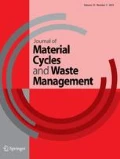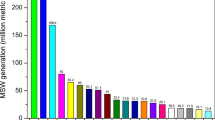Abstract
Municipal solid-waste management (MSWM) in developing countries has faced common challenges such as no separation at source, complicated collection processes, and open landfills. Previous studies suggested that it is essential that MSWM policy adapts to local contexts and situations in its implementation. In Indonesia, neighborhood associations exist to enhance cooperation among community members. Community-based recycling activities called waste banks (WBs) in Indonesia utilize the functions of neighborhood associations. This study analyzed how local governments supported community-based WB programs and examined the institutional mechanism of the central WB which was established as part of the community-based WB integration to the city’s MSWM policy in Makassar, Indonesia. Through a desk study and semi-structured interviews with key actors in community-based WBs, it was found that the local government’s major intervention was the establishment of a mayor’s regulation to set up a central WB using the municipal budget to facilitate waste transaction between community-based WBs and recyclers. The institutional framework of the central WB and the functions performed by the central WB, such as recyclable waste collection from community-based WBs and market price analysis on recyclable waste, were clarified through this study.

Similar content being viewed by others
Notes
YPN also provide support to the leaders and members of community-based WBs while giving suggestions to the local politicians to promote the appropriate environmental management.
Active status of community-based WB indicates the status based on the transaction of waste with central WB.
References
Wilson DC (2007) Development drivers for waste management. Waste Manag Res 25(3):198–207
Meidiana C, Gamse T (2010) Development of waste practices in Indonesia. Eur J Sci Res 40(2):199–210
McDougall F et al (2001) Integrated solid waste management: a life cycle inventory, 2nd edn. Blackwell Science, Hoboken
Marshall RE, Farahbakhsh K (2013) Systems approaches to integrated solid waste management in developing countries. Waste Manag 33:988–1003
Pasang H et al (2007) Neighborhood-based waste management: a solution for solid waste problems in Jakarta, Indonesia. Waste Manag 27:1924–1938
Kementerian Lingkungan Hidup dan Kehutanan (2015) Laporan Kementerian Lingkungan Hidup adan Kehutanan 2013. Ministry of Environment and Forestry, Jakarta
Badan Pusat Statistik (BPS) (2015) Statistik Indonesia: statistical yearbook of Indonesia. https://-istmat.info/files/uploads/47409/statistical_yearbook_of_indonesia_2015.pdf (Last accessed on the 8 Nov 2019)
Damanhuri E (2017) Country chapter state of the 3Rs in Asia and the Pacific, United Nations Centre for Regional Development
Mehra R et al (1996) Women in waste collection and recycling to Ho Chi Minh City. Popul Environ 18(2):187–200
Mongkolnchaiarunya J (2005) Promoting a community-based solid-waste management initiative in local government: Yala municipality Thailand. Habitat Int 29(2005):27–40
Wijayanti DR, Suryani S (2015) CBWB as community-based environmental governance: a lesson learned from Surabaya. Proc Soc Behav Sci 184:171–179
Ministry of Environment (2012) Regulation of the State Minister for environment of the Republic of Indonesia, number 13 of 2012 on implementing guidelines for reduce, reuse and recycle through CBWB
Ulung A., (2018) Children take center stage in waste bank initiative. The Jakarta Post. https://www.thejakartapost.com/life/2018/04/17/children-take-center-stage-in-waste-bank-initiative.html (Last accessed on 8 Nov 2019)
Yanti W., (March 14, 2019) Personal communication with Utomo I. and Limbong D
Tallei TE et al (2013) Local community-based initiatives of waste management programs on Bunaken Island in North Sulawesi, Indonesia. Res J Environ Earth Sci 12(5):737–743
Indrianti N (2016) Community-based Solid CBWB model for sustainable education. Proc-Soc Behav Sci 224:158–166
Tahir M et al (2009) Solid waste management at neighborhood level in Jakarta, Indonesia. In Proceedings of the Annual Conference of Japan Society of Material Cycles and Waste Management, pp. 277–277, Japan Society of Material Cycles and Waste Management
Purba H et al (2014) Waste management scenario through community based CBWB A case study of Kepanjen district Malang regency, Indonesia. Int J Environ Sci Dev 5(2):212
Murase N et al (2015) Analysis on relationship between residents’ awareness and waste bank activities in Indonesia—Case of Balikpapan city, (In Japanese). Kankyou-Jouhou Kagaku Ronbunshu 29:267–272
Ulhasanah N (2017) Assessment of citizens’ environmental behavior toward municipal solid waste management for a better and appropriate system in Indonesia: a case study of Padang City. J Mater Cycles Waste Manag 20(2):1257–1272
Premakumara D et al (2016) Transition from waste management to resource management a potential of CBWB program. JSM Environ Sci Ecol 4(4):1037
Badan Pusat Statistik., (2015) Intermediate population census
Creswell J (2014) Research design: qualitative, qualitative, and mixed methods approaches. Sage publishing, Thousand Oaks
Bouabid A, Louis G (2015) Capacity factor analysis for evaluating water and sanitation infrastructure choices for developing communities. J Environ Manag 161:335–343
Wilson D et al (2009) Building recycling rates through the informal sector. Waste Manag 29:629–635
Soderborg S (2015) Volunteer spies, volunteer bureaucrats: neighborhood governance in Indonesia and around the world, in Midwest political science Association 2015 Conference. Chicago, IL
Ministry of Interior, Permendagri No. 61 Tahun 2007 Pedoman Teknis Pengelolaan Keuangan Badan Layanan Umum Derah Dengan Rahmat Tuhan Yang Maha Esa Menteri Dalam Negeri, https://luk.staff.ugm.ac.id/atur/blu/Permenkeu61-2007PengelolaanKeuBLUDaerah.pdf. Last access: 17 May 2019
Acknowledgements
We would like to express our sincere appreciation to all the stakeholders who contributed to the data collection in Makassar. Our appreciation goes out to those from the Indonesian national government, NGOs, neighborhood associations, and the private sector who inspired us to continue this research. Field surveys were strongly supported by staff members of Yayasan Peduli Neguri and Mr. Iman Utomo in the field of waste management. Last but not least, this research is partially financially supported by the Center for Material Cycles and Waste Management of the National Institute for Environmental Studies in Japan and was also partly supported by the Environment Research and Technology Development Fund of the Japan Environmental Restoration and Conservation Agency (Project ID: S-16).
Author information
Authors and Affiliations
Corresponding author
Additional information
Publisher's Note
Springer Nature remains neutral with regard to jurisdictional claims in published maps and institutional affiliations.
Rights and permissions
About this article
Cite this article
Kubota, R., Horita, M. & Tasaki, T. Integration of community-based waste bank programs with the municipal solid-waste-management policy in Makassar, Indonesia. J Mater Cycles Waste Manag 22, 928–937 (2020). https://doi.org/10.1007/s10163-020-00969-9
Received:
Accepted:
Published:
Issue Date:
DOI: https://doi.org/10.1007/s10163-020-00969-9




